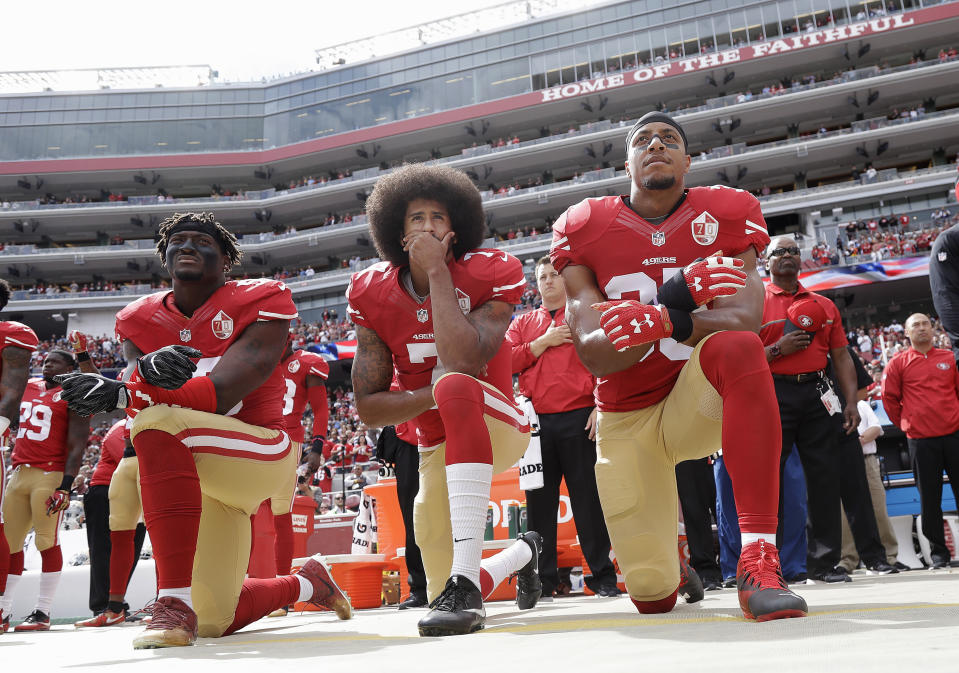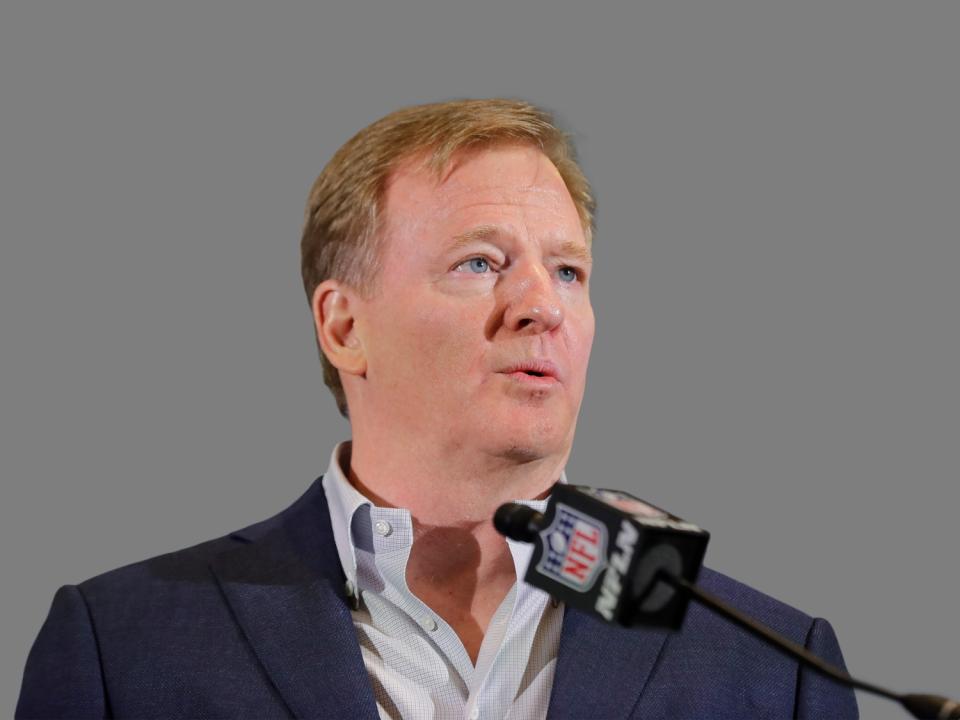The NFL’s Black Lives Matter statement was years in the making
In 2017, with a football season on the horizon, and with Colin Kaepernick out of work, a group of black NFL employees sought an audience with senior leadership and the commissioner. They met with Roger Goodell and other top executives in August, at 345 Park Avenue in New York, around the time some 1,000 people protested Kaepernick’s unemployment outside.
“Why can’t he get a job?” the masses wondered. Employees wondered, too.
“Is he being blackballed? Can you guys talk to us?”
They wanted answers. Every day, when they’d leave the office, they’d go home to family and friends, and defend the NFL. But when they hopped in cars or on subways the next morning, some questioned the values of the company they worked for.
So they sat down with Goodell, executive vice president of football operations Troy Vincent and others. They asked those questions, and more.
“Where does the NFL stand on these issues that Kaep is kneeling for?”
“Can you at least give us the confirmation that somebody is not being silenced for kneeling on issues that we care about?”
“Why haven’t we said that we acknowledge racism and oppression and police brutality, and we condemn it?”
Esé Ighedosa, then a league employee and leader of the NFL’s Black Engagement Network (BEN), was in that meeting.
“We wanted the NFL to say, ‘We condemn racism and oppression,’ and ‘black lives matter,’ ” she recalls now. “The NFL wasn’t ready. They weren’t prepared to say the things that they needed to say.”
And for three years, they didn’t. A week after George Floyd’s death, with the world erupting in protest, they didn’t. The vagueness hurt dozens, likely hundreds of employees. It led to a week of raw, emotional, “uncomfortable” Zoom calls, on which staffers shared personal stories of police brutality, or of understanding white privilege. Finally, on Friday, after players released a powerful video pushing the league to adopt a stronger stance, Goodell did.
“We, the National Football League, condemn racism and the systematic oppression of black people,” he said from his basement. “We, the National Football League, admit we were wrong for not listening to NFL players earlier and encourage all to speak out and peacefully protest. We, the National Football League, believe black lives matter.”
Ighedosa watched and thought, “Wow.”
“It’s a full-circle moment,” she says. “Everything that the commissioner said in his video, BEN asked him and the league to say three years ago.”
The shift, several current and former NFL employees say, was a culmination of years of dogged work behind the scenes, by everybody from the founders of the league’s original Diversity Council to recent hires who bravely spoke up last week. The players’ video, as one former employee says, was “the straw that broke the camel’s back.” And indeed, according to an NFL spokeswoman, Goodell saw it during a senior staff meeting and said, “I should respond to them.”
All of this, Ighedosa says, “has been in the works for years. People have lost sleep over it. … That’s the story that needs to be told. Because it’s never been told before.”

The fight within
In the summer of 2016, after police killed Alton Sterling and Philando Castile on back-to-back days, black NFL employees walked into work overwhelmed. Pressure to perform never ceased. But their minds wandered, disturbed. Some took walks around the block together. Others turned empty meeting rooms into safe spaces and let emotions fly.
A half-dozen of them decided to form an affinity group. They got buy-in from executives. They launched the Black Engagement Network to support colleagues and advocate for racial diversity throughout the league.
It’s a fight that began long before they arrived at the NFL, one that dates back to the league’s first black hire. It continued, in the early 2000s, with the formation of a Diversity Council, and leaders like Guy Troupe and Derrick Crawford. The office’s diversity at the time, Crawford says, was “terrible” and “deplorable.” He recalls one meeting when discussions with Goodell, the council’s executive sponsor, became “vigorous.” Goodell fetched commissioner Paul Tagliabue, who admitted the NFL’s record on diversity was “pathetic.”
So the Council pushed for change — but met pushback. They proposed a new chief diversity officer role; the proposal was denied. Asked whether he felt aggressive pushes for diversity would hurt his upward mobility within the company, Crawford says: “Absolutely. Because they didn’t support it.”
Progress was slow. Advocacy always took courage, in what one former employee calls a “corporate culture laden with fear.” Any NFL job is coveted. “Once you get there,” Ighedosa says, “you’re constantly battling being grateful to be there, but also wanting the NFL to be a better place.” She and others walked a fine line: “How can I make an impact without alienating myself or causing problems?”
BEN met with human resources to discuss hiring practices, and organized “lunch and learns” with Goodell and other executive VPs where they openly discussed race. There was resistance to codifying some reforms, but the league became more “intentional” in its recruiting. Reps traveled to black business and media conferences. The league sponsored HBCU Battle of the Brains, and organized a diversity and inclusion summit in Los Angeles.
The fight for stronger public messaging, though, was one that BEN, in 2017, couldn’t win.
“The NFL still hadn’t comprehended that they had transcended sports,” Ighedosa says. “In their minds, they do great work. They donate to a lot of organizations, and they help out a lot of people in need. … Why can’t the work speak for itself?
“That’s been the internal battle in the NFL: It’s not enough to just donate to the organizations that are helping with the problem. You have to use your platform. And when the NFL says something is wrong, when the NFL says, ‘black lives matter,’ that is so powerful. … You have a responsibility to your players, to your employees, to your fans, to speak on these issues and denounce certain things.”
And when the league didn’t?
“When you water down the language, you water down our experiences,” Ighedosa says.
“For someone like me, and a lot of black employees, that was hard to reconcile.”
An emotional week
Ighedosa left the league office in 2018. Her legacy and BEN persisted. They framed the past two weeks and Friday’s admission. A new generation of “rogues” and forceful voices carried her message forward.
Jarick Walker was one of them. He was hired this past winter. He nearly cried tears of joy at the Super Bowl. He loved his first few months on the job.
He’s also a runner. And as a black man, the March shooting death of Ahmaud Arbery shook him.
“It’s something that I can’t not think about every time I go outside,” he says now. “I make sure I go up to my girlfriend and give her a kiss before I go out for a run. Just ’cause — who knows?”
Two months later, a police officer knelt on George Floyd’s neck, and Walker’s mind stuck on that video, that image.
“Every time you see it, you think it could be a brother, a cousin, a sister, a niece, a nephew, even a parent,” he says. “And that’s scary.”
He still had to work, though. In the days after Floyd’s death, he’d log on with uncertainty. He knew where his mind was. He didn’t know if coworkers, particularly white coworkers, were even aware. NFL executives hadn’t addressed it. On Thursday or Friday, he reached out to teammates: “Hey, when things like this happen, do we get internal messaging? Do we [do] … nothing?”
Walker has friends at Nike, and tech start-ups, and Goldman Sachs, and in the music business.
“They were having conversations,” he says. “Or at least an email went out. I didn’t think it would be acceptable for that not to happen [at the NFL]. As a black person, you just hope that you work for a place that believes that black lives matter.”
On Saturday, the NFL released a statement and didn’t say that. Which hurt.
Thus began the most emotional work week many league employees can remember. BEN mobilized to check in on black employees. Alexxis Franklin and other co-chairs relayed sentiments to senior leadership. On Thursday, BEN hosted some 120 people for a session titled “Let It Out.” The entire call, Franklin says, was “intense.”
Departments held heavy meetings as well. They blocked off one hour on calendars. Many Zoom calls lasted three. On Tuesday and Wednesday, Walker and countless others spoke up. Individuals contacted HR and senior leadership. Around 20 members of the social media team sent a letter to a top executive. They and many others felt the league must say more than it already had.
By this time, an NFL spokeswoman says, Goodell had already decided he would. The players’ video, produced by a “rogue” social media staffer, shaped Goodell’s message. A Friday afternoon town hall solidified it.

‘It’s about time’
Walker’s heart thumped as he spoke. His hands and legs trembled. He was a first-year employee addressing an entire multi-billion-dollar company. His passion, though, overrode any nerves.
“In a league where the black players make up 70 percent of the league, the right thing to do here should be a no-brainer,” he told Goodell and hundreds of others, orating a prepared statement. “But perhaps because our league offices are only made up of 10 percent black employees, we can’t seem to get this right.
“I am first-generation Jamaican American. My family barely knew what football was when they came to the U.S. But football and the NFL was something that brought my family together and made us feel a part of this country. It was America’s game. When the tragedies of 9/11 happened, the NFL brought this country together. When Hurricane Katrina wiped out parts of this country, the NFL brought this country together. Now, our country is dealing with another disaster, another tragedy, one that has been going on for a long time and the NFL has not stepped up to bring this country together. Why?
“All week, I have been losing sleep about what has been going on in this world, not knowing where my employer stands on the topic, and what I feel the NFL should do. I believe the players said it best: Condemn racism. Apologize to the players who peacefully protested for this very topic. Reverse the ban. Lastly, let the world know by shouting from the mountain tops that black lives matter.”
Hours later, Goodell said it. Ighedosa thought back on the years of work that enabled his words. Crawford, the Diversity Council original, was “stunned,” but said to himself: “It’s about time.”
The question now is what comes next.
“A lot of our non-black colleagues and leaders were admitting fault, or sharing how they’re going to do better,” Walker says. “And there was this unifying moment, that everyone’s going to hold everyone accountable. I truly believe the NFL can take its rightful place in being a leader, in what’s done externally, but also what’s done internally, around this whole topic, this whole movement. And that’s special. That’s what I want to be a part of. A company like the NFL has the power to change the country, and the world. And I felt like a lot of people recognize that power, and are going to push to be this catalyst for change.”
In the immediate-term, though, there’s one more step the NFL could take.
Would it mean something to you for them to specifically mention Colin Kaepernick? I ask Walker.
“Ah,” he says with a half-chuckle, half-sigh. Then, unequivocally: “Yeah, it would. It would mean a lot.”
And is the sense you get that it would mean a lot to other NFL employees, too?
“Absolutely.”
More from Yahoo Sports:

 Yahoo Sport
Yahoo Sport 






































